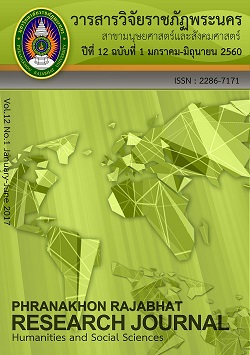การปกครองท้องถิ่นเปรียบเทียบ: ประเทศไทยกับประเทศมาเลเซีย
Main Article Content
Abstract
การวิจัยนี้มีวัตถุประสงค์เพื่อศึกษา 1) รูปแบบและโครงสร้างการปกครองส่วนท้องถิ่นเปรียบเทียบระหว่างประเทศไทยกับประเทศมาเลเซีย 2) การเปิดโอกาสให้ประชาชนเข้ามามีส่วนร่วมในการพัฒนาท้องถิ่นเปรียบเทียบระหว่างประเทศไทยกับประเทศมาเลเซีย และ 3) ลักษณะการมีส่วนร่วมของประชาชนในการพัฒนาท้องถิ่นเปรียบเทียบระหว่างประเทศไทยกับประเทศมาเลเซีย โดยใช้การวิจัยภาคสนาม และการวิจัยเอกสาร ทั้งในประเทศและต่างประเทศ อาทิ พระราชบัญญัติและกฎหมายที่เกี่ยวข้องกับการมีส่วนร่วมของประชาชน องค์กรปกครองส่วนท้องถิ่นของไทยและประเทศมาเลเซีย ตลอดจนใช้วิธีการสัมภาษณ์ผู้ให้ข้อมูลสำคัญ คือ ผู้บริหารองค์กรปกครองท้องถิ่นทุกระดับและประชาชนของแต่ละประเทศ การวิเคราะห์ข้อมูลเชิงคุณภาพที่ได้มาจากการเก็บรวบรวมข้อมูล คือ ข้อมูลทุติยภูมิคือจากเอกสารต่างๆ ที่เกี่ยวข้อง และข้อมูลปฐมภูมิคือจากการสัมภาษณ์แบบเจาะลึกผู้ให้ข้อมูลสำคัญและการสนทนากลุ่ม และการสังเกตทางกายภาพและสิ่งแวดล้อมพื้นที่ที่ทำการศึกษา นำมาวิเคราะห์ด้วยการตีความเชิงอุปนัยและการวิเคราะห์เชิงตรรกะ ผลวิจัยพบว่า 1) รูปแบบและโครงสร้างการปกครองของไทยกับมาเลเซียมีความแตกต่างกันในประเด็นรูปแบบประเทศไทยใช้รูปแบบการปกครองแบบรัฐเดี่ยว ส่วนประเทศมาเลเซียใช้รูปแบบสหพันธรัฐ ที่เหมือนกันคือใช้ระบอบประชาธิปไตยในระบบรัฐสภาเหมือนกัน และแบ่งเป็น 3 ฝ่าย คือ บริหาร นิติบัญญัติ และตุลาการ 2) รูปแบบและโครงสร้างการปกครองท้องถิ่นของไทยกับมาเลเซียมีความแตกต่างกันมาก โดยมาเลเซียจะมีการปกครองท้องถิ่นในระดับรัฐบาลท้องถิ่น (รัฐ) ไม่มีองค์กรปกครองส่วนท้องถิ่นในระดับล่างหรือขนาดเล็กและมีจำนวนไม่มากเหมือนของไทย ที่มีทุกระดับ ทุกขนาด และมีหลายประเภท การปกครองท้องถิ่นของประเทศมาเลเซีย คือ รัฐบาลท้องถิ่น (รัฐ) สามารถเปรียบเทียบได้ใกล้เคียงกับกรุงเทพมหานคร คือ มีฝ่ายบริหารและฝ่ายนิติบัญญัติเหมือนกัน ด้านโครงสร้างระบบราชการมีคล้ายคลึงกันคือ มีหน่วยงานที่ทำหน้าที่นำนโยบายไปสู่การปฏิบัติ โดยกรุงเทพมหานครมีสำนักต่าง ๆ มีฐานะเป็นหัวหน้าข้าราชการทำหน้าที่กำกับการดำเนินงานของเขตต่าง ๆ ทั้ง 50 เขต ส่วนรัฐบาลท้องถิ่น (รัฐ) ของมาเลเซีย คือ สำนักเลขาธิการรัฐ มีฐานะเป็นหัวหน้าข้าราชการรับผิดชอบในงานบริหารส่วนราชการระดับล่างที่ขึ้นตรงต่อรัฐ คือ อำเภอ และตำบล และ 3) ลักษณะการมีส่วนร่วมและการเปิดโอกาสให้ประชาชนเข้ามามีส่วนร่วมในการพัฒนาท้องถิ่น พบว่า การใช้สิทธิเลือกตั้งผู้แทนของตนเองของประเทศไทยและประเทศมาเลเซียมีความเหมือนกัน คือ การเปิดโอกาสให้ประชาชนเข้ามามีส่วนร่วมในการใช้สิทธิในการเลือกตั้งผู้แทนของตนเองไปเป็นผู้บริหารขององค์กรปกครองส่วนท้องถิ่น โดยลักษณะการมีส่วนร่วมในการใช้สิทธิเลือกตั้งผู้แทนนั้นเป็นการลงคะแนนเลือกหัวหน้าฝ่ายบริหารและสมาชิกสภานิติบัญญัติโดยตรงทั้ง 2 ฝ่าย เหมือนกัน
The purposes of the study “Comparative Local Government: Thailand and Malaysia”, are to do comparative study on 1) the form and structure of local administration of Thailand and Malaysia, 2) the openness for local resident involvement in communal development in Thailand and Malaysia, and 3) the characteristics of local resident involvement in communal development in Thailand and Malaysia. The research methods employed are field study and document study both within Thailand and Abroad. These documents are such as legislation and acts that support local involvement with local administration in Thailand and Malaysia. The research had also undergone interviewing process with keys individual: Director of local administration body at every level, and the people both in Thailand and Malaysia. The qualitative data analyzed were those collected from relevant secondary source documents and primary source in-depth interview, group discussion, and physical observation of the study area. Data is analyzed through interpretation and logical assumption. From the analysis of said data, the research found that: 1) The comparative study on the form and structure of local administration of Thailand and Malaysia shows overall differentiation between the two countries. Thailand on the one hand is a centralized state while Malaysia is Multi Federal State. The similarity lies in the system of democracy, the existence of congress, and the division of power into 3 branches of the executive, legislature, and the judiciary. 2) The form and structure of local administration in the two countries stand in stark contrast. In Malaysia, the local administration lies at the state administration level with no existence of sub-division body for each local location. The number of administration division is significantly less comparing to Thailand where there are administration at each level and size and types. The local administration of Malaysia is local government (State level) similar to that of Bangkok; dividing to Legislation and Administration. There is similarity in term of structure; there is a body that translates policy into implementation. For Bangkok, there are multiple offices that acts and are responsible for each district for all 50 districts. The local administration in Malaysia, however, has state secretariat office that is responsible for the lower body at district and sub-district level that directly answers to the State. and 3) On the openness to participation of local administration, both Thailand and Malaysia allows people to participate in election of their representative to office. The participation in this election are similar that both countries directly vote to elect the head of administration (Government) and for the legislature.
Article Details
Each publish articles were copyright by Phranakorn Rajabhat University
Any contents which appeared in each articles in the journal were authors personal opinion. It did not relate to Phranakorn Rajabhat University and other instructors in the university. Each authors would take responsibility on their articles. If there are any mistake, the authors will take responsibility themselves
References
ลิขิต ธีรเวคิน. (2546). การเมืองการปกครองไทย. (พิมพ์ครั้งที่ 6). กรุงเทพฯ :
โรงพิมพ์มหาวิทยาลัยธรรมศาสตร์.
วัชรินทร์ อินทพรหม. (2557). รูปแบบการมีส่วนร่วมในการพัฒนาท้องถิ่นของประชาชน.
วารสารบัณฑิตศึกษา มหาวิทยาลัยราชภัฏวไลยอลงกรณ์ ในพระบรมราชูปถัมภ์.
(3), 278-289.
สำนักคณะกรรมการการกระจายอำนาจไปสู่ท้องถิ่น. (2546). ความรู้เบื้องต้นเกี่ยวกับการ
กระจายอำนาจให้แก่องค์กรปกครองส่วนท้องถิ่น. กรุงเทพฯ : สำนักงานคณะ
กรรมการการกระจายอำนาจไปสู่ท้องถิ่น.
Almond, G.A. & Verba S. (1965). The Civic Culture. Boston: Little,
Brown and Company Inc.
Turton, Andrew. (1987). Production, Power and Participation in Rural:
Experience of Poor Farmers Groups. Bangkok : United Nation
Research Institute for Social Development.


